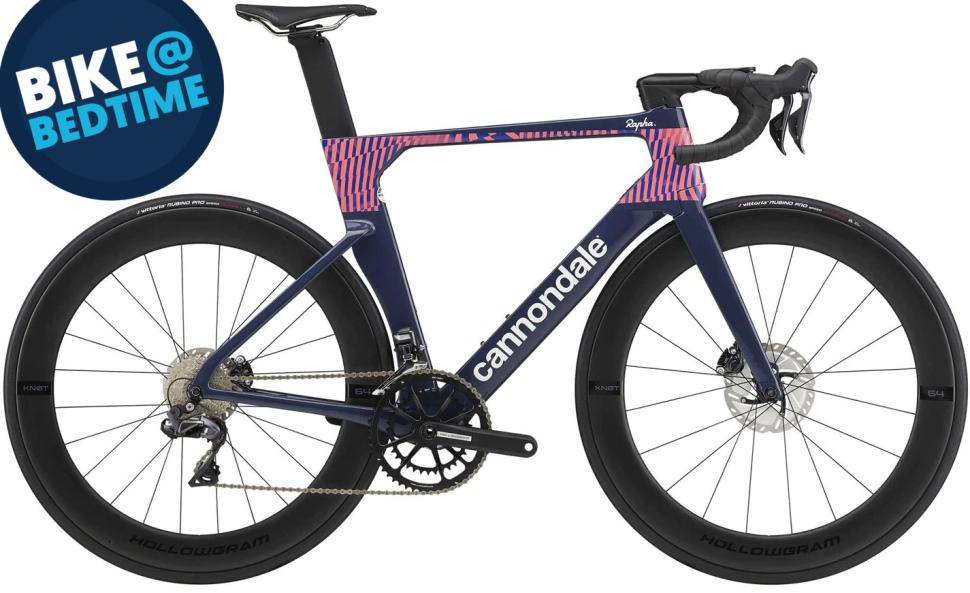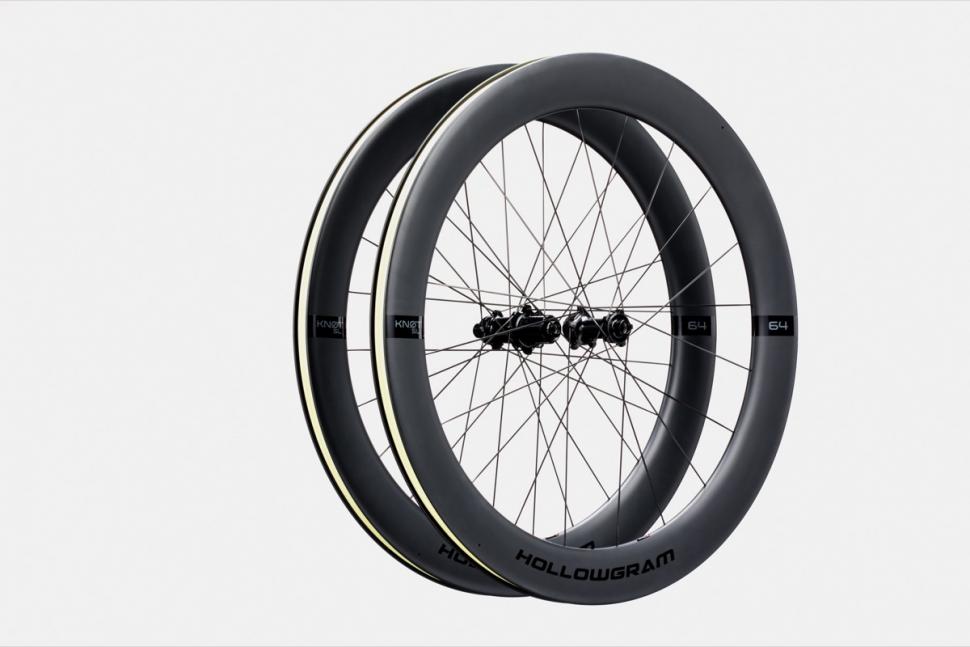- News
- Reviews
- Bikes
- Components
- Bar tape & grips
- Bottom brackets
- Brake & gear cables
- Brake & STI levers
- Brake pads & spares
- Brakes
- Cassettes & freewheels
- Chains
- Chainsets & chainrings
- Derailleurs - front
- Derailleurs - rear
- Forks
- Gear levers & shifters
- Groupsets
- Handlebars & extensions
- Headsets
- Hubs
- Inner tubes
- Pedals
- Quick releases & skewers
- Saddles
- Seatposts
- Stems
- Wheels
- Tyres
- Tubeless valves
- Accessories
- Accessories - misc
- Computer mounts
- Bags
- Bar ends
- Bike bags & cases
- Bottle cages
- Bottles
- Cameras
- Car racks
- Child seats
- Computers
- Glasses
- GPS units
- Helmets
- Lights - front
- Lights - rear
- Lights - sets
- Locks
- Mirrors
- Mudguards
- Racks
- Pumps & CO2 inflators
- Puncture kits
- Reflectives
- Smart watches
- Stands and racks
- Trailers
- Clothing
- Health, fitness and nutrition
- Tools and workshop
- Miscellaneous
- Buyers Guides
- Features
- Forum
- Recommends
- Podcast
feature
 2021-cannondale-systemsix-hi-mod-carbon-ultegra-di2
2021-cannondale-systemsix-hi-mod-carbon-ultegra-di2Cannondale’s SystemSix: can what was billed as “the world’s fastest road bike” still cut it?
Cannondale may have turned up late to the aero-road market, but when it did arrive in 2018, it unleashed something special. Three-and-a-half years in the making, the SystemSix was the world’s fastest UCI-legal road bike, according to Cannondale. The platform remains in the 2024 range but the EF Pro Cycling team use the SuperSix all-rounder road bike and the SystemSix looks increasingly dated. Has its time come and gone, or is it just due a revamp?
Cannondale has never seen the SystemSix as simply an aero road bike. It was launched as “a complete speed system” designed to be fast uphill as well as on the flat. That said, it sat alongside the SuperSix Evo in Cannondale’s range, so it was always going to be seen as the aero road bike compared with its lightweight stablemate.
However, lots has changed in the road bike market over the past few years. Some brands have moved towards a single top-end road platform – think about Specialized’s Tarmac SL7 and SL8, for instance – and Cannondale launched a new aero-optimised SuperSix Evo 4 last year, so where does that leave the SystemSix?
Cannondale boasts, “[The SystemSix is] faster than lightweight climbing bikes on any climb up to a 6% gradient or more, depending on rider’s power to weight. To put that in perspective, most revered HC climbs in the Tour only average 7-8%.”
Okay, but if the SystemSix is to remain in Cannondale’s range, after six years it surely needs an update.
Cannondale launched the SystemSix as “not only the fastest in the wind-tunnel or just the fastest for a select few riders in a select few scenarios, but the fastest for anyone interested in going faster”.
A big old claim, that!
Cannondale said that the SystemSix was built on a six-part foundation—frame, fork, seatpost, bar, stem and wheels—all engineered to work together as one system. Australian aerodynamics expert Nathan Barry was brought in as a design engineer and worked on the drag efficiency across the whole piece.
Barry’s new way of calculating aerodynamic efficiency, which he called Yaw Weighted Drag, took into account the relative importance of various yaw angles. If you’re interested, you can get the details in his paper: A New Method for Analysing the Effect of Environmental Wind on Real World Aerodynamic Performance in Cycling.
“Precisely truncated airfoil profiles in the frame, fork and seatpost maintain airflow attachment across important yaw angles and minimise drag, while delivering world-class stiffness and ride feel,” Cannondale said.
Compared to a lightweight road bike of the time, the aerodynamic performance of the SystemSix was said to save you more than 50 watts when riding solo or at the front of a group at 48km/h (30mph). The bike was said to save you 30 watts when drafting at the same speed.
As mentioned, Cannondale also said that the SystemSix’s aerodynamic superiority meant that it was faster on gradients up to 6%.
What’s interesting about Cannondale’s engineering process is where the thinking began. It said, “Since the front wheel is the leading edge of the whole bicycle it sees the cleanest airflow and therefore it is an important starting point for aerodynamic optimisation.”
With this in mind, the HollowGram KNØT64 wheels were the first component of the whole SystemSix build, and the 64 deep rims were optimised around 26mm tyres. With a huge 32mm outer rim width combined with a significant 21mm internal width, a tyre that is designated 23mm will measure 26mm on these rims.
Unlike most, Cannondale’s rims are wider than the tyres. This is said to “combine the speed benefits of an ultra-low drag profile with the real-world rideability benefits of larger tyres”. Balancing low drag and low rolling resistance, Vittoria Rubino Pro Speed tyres were considered to fit this requirement best.
Cannondale said that with the rake of the fork causing airflow to run back up the fork leg towards the crown, it introduced a “chine” at the bottom of the head tube to “redirect this flow and channel it downstream” to prevent it from interfering with the clean flow over the fork crown and head tube.
To achieve a fully integrated system, but with the ability to adjust the stack without disconnecting cables/hoses, Cannondale decided to route the cables through an enclosed channel in the front of the head tube. This hidden channel bypasses the headset bearings and fork steerer.
This “ease-of-use design” meant restricting how much you could turn the handlebar to ± 50°. However, Cannondale said this was a worthwhile trade-off because you typically turn the bar less than 30° when riding.
From afar, the KNØT SystemBar and Stem may look like a one-piece system, but Cannondale delivered the convenience of a two-piece setup with 8° of pitch adjustment to allow you to dial in your position.
The truncated airfoil shape of the SystemSix’s seatpost was specifically designed for aero efficiency in the higher speed airflow caused by the movement of a rider’s legs, said Cannondale.
EF Pro Cycling sometimes used the SystemSix in 2023. Ireland’s Ben Healy won the eighth stage of the Giro d’Italia on one, for example, with a ridiculous 50km (31 mile) solo attack. However, the SuperSix Evo is the team's usual weapon of choice, the latest version saving 11W over the previous design at 45km/h (28mph), according to Cannondale.
Where does that leave the SystemSix, then? Well, Cannondale could just let it fade away and go all in on the SuperSix Evo. That’s what it did previously, even though most brands had a two-pronged strategy at the top of their road bike lineup at the time.
The other option would be for Cannondale to update the SystemSix. If it goes down this route, the SystemSix would need to lose weight. Back in 2018, we weighed the HiMod Ultegra Di2 SystemSix in a 58cm frame size, including bottle cages and computer mount, at 7.8kg. A fully built Cannondale SuperSix Evo Lab71, on the other hand, tips the scales at the UCI minimum weight limit of 6.8kg. A bike that's a kilogram heavier doesn't really cut it in 2024, even if the extra weight results in improved aero performance.
Cannondale has yet to give the SystemSix a LAB71 makeover. Here’s how Cannondale describes LAB71: “Utilising cutting-edge materials and processes, combined with stunning finishes and a curated selection of the finest components available, LAB71 framesets and complete bikes sit at the pinnacle of cycling performance and are the crown jewels of Cannondale’s product line.”
There's a LAB71 SuperSix Evo, but no SystemSix equivalent, which is a bit odd. Could there be one on the way?
We reckon that if Cannondale does a major redesign of the SystemSix, it would need to ditch the steering stop pin – it’s not the biggest problem in the world, but it can be annoying when manoeuvring at slow speeds – and we’d expect to see features that were included on the latest SuperSix Evo, such as a shift to a threaded bottom bracket.
If all this happened, though, the gap between the SystemSix and the SuperSix would be narrower than ever, so we can’t see Cannondale making an update until it has some really special aero tech to shout about.
Although our guess is that Cannondale is working on a new version of the SystemSix, we've got no insider knowledge to share on this one. What do you think?
Anna has been hooked on bikes ever since her youthful beginnings at Hillingdon Cycle Circuit. As an avid road and track racer, she reached the heady heights of a ProCyclingStats profile before leaving for university. Having now completed an MA in Multimedia Journalism, she’s hoping to add some (more successful) results. Although her greatest wish is for the broader acceptance of wearing funky cycling socks over the top of leg warmers.




Think this line of argument * is almost a default and not just for collisions involving cyclists. e.g. "They ran into me ergo it's their fault"....
I think I'm just going to go down half a size which should fix it.
No mention of the cost...at $1449 I think I'll stick to the old "I feel a bit thirsty, better have a drink" system.
One bike seized? I'm sure there were four of them. ‐‐---- Quote "E-bike riders caught using police drone" Did the steal the drone, as well?
My bike was stolen from a supermarket car park in Calais, it was locked on a roof carrier....
Mirror advised.
Yup - Rivermind! ****SPOILER ALERT***** https://www.radiotimes.com/tv/sci-fi/black-mirror-common-people-ending-e...
A friend told me that Gravaa doesn't work with inserts. Visma actually glued their tubeless tyres on to avoid tyre detachments! Sounds like a...
That was my first thought when I saw, and read it........